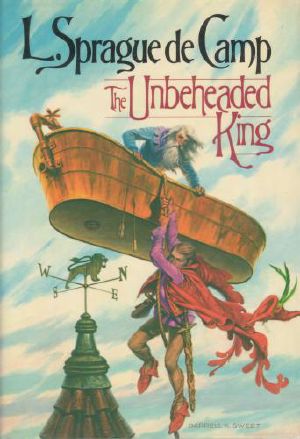The Unbeheaded King

- Authors
- DeCamp, L. Sprague
- Publisher
- Pyramid Books
- Date
- 0101-01-01T00:00:00+00:00
- Size
- 0.19 MB
- Lang
- en
This final novel in The Reluctant King trilogy (preceded by The Goblin Tower and The Clocks of Iraz) is the most entertaining read of the three. I had already come to respect and feel comfortable with the good and brave Jorian, unbeheaded king of Xylar, and his wizard friend Karadur, and I had been waiting the equivalent of several hundred pages to read about Jorian's long-planned, very dangerous mission to rescue his chosen wife Estrildis from Xylar. As always, Jorian's adventures are, much to his own chagrin, fraught with danger and excitement at every turn, and the events of this novel are certainly no exception. For two years the Xylarians have pursued Jorian because he had escaped the kingdom with his head at the end of his five-year reign and thus thrown the politics of the country into turmoil. In Xylar, each king is beheaded after five years, and the next king is chosen by throwing the passing king's head into the crowd to see who catches it. Jorian's plan to reenter Xylar in an effort to get his chosen wife back is incredibly dangerous, but true love makes any good man risk his own life in its pursuit. In the way of all Jorian's plans and wishes, however, things never go quite the way he hopes.All three novels in the trilogy can be characterized as humorous fantasy, but The Unbeheaded King is by far the funniest. The action begins with Jorian and Karadur flying into Xylar in a large golden bathtub (the explanation for which can be found in The Clocks of Izar); amazingly, Jorian enters the tower where his lady resides and comes close to succeeding in his objective at the beginning of the novel. Then he trips and causes an alarm to ring out, forcing him to shimmy back up to the hovering bathtub and flee forthwith. Undaunted, Jorian, back in the neighboring land of Othomae, seeks other means for achieving his overriding aim. When he asks a sorcerer to summon a demon to attempt a rescue, the banter between the unhappy demon and the sorcerer is well-nigh hilarious, with the demon complaining about being summoned from his plane unjustly and threatening to foment his fellow demons into an attack on the human plane of existence after he finishes his assignment. Very humorous examples of why you should never underestimate a demon's capacity for stupidity produced many a laugh on my part. Several of Jorian's famous escapes from danger are, as usual, fantastic and highly entertaining, and the miscellaneous stories we hear from Jorian's lips as well as those of his friends (both human and, in one case, a ghost) bring even more humor to this enchanting work of fantasy. I am sad to see this trilogy end. I would gladly read novel after novel based on the times and trials of good Jorian and his reluctant ally Karadur. De Camp is a fantastic writer, bringing to vivid life the lands and peoples of his fictional world, steering his fantasy along at full steam, never allowing for dull moments. You do not read about De Camp's imaginative realms, you journey there yourself and watch your friends and heroes go about their business right in front of your eyes. One cannot help but me amazed at both the bad luck and the good luck our heroes are met with, nor does one ever tire of trying to figure out how they are going to get out of each successive mess they perpetually find themselves in. It may take the reader a few pages to get comfortable with the mediaeval-sounding language the characters often use, but familiarity comes so quickly that you may find yourself unconsciously uttering words like forsooth and instanter in your normal conversations and cursing any bad luck that comes your way with phrases such as "by Imbal's brazen balls." This is one of the more enjoyable fantasy books I have read in a long time. Although the conclusion played out a little differently from what I was expecting, I was thrilled with the way De Camp ended this epic because it seems uniquely and honestly faithful to the characters and the spirit of their adventures. It is with sadness that I bid friends Jorian and Karadur goodbye after three novels, but I take with me the memory of a joyous read full of great humour, enthralling adventures, and utter fascination. If you want to read fantasy as it was meant to be written, you would do much worse than to pick up De Camp's account of the adventures of the unbeheaded king.